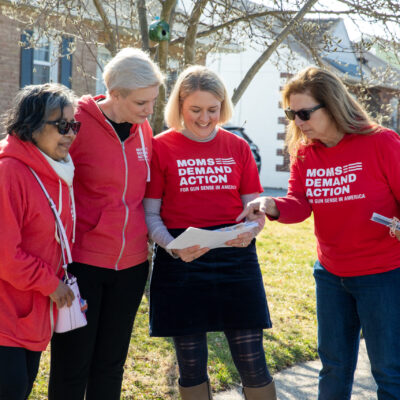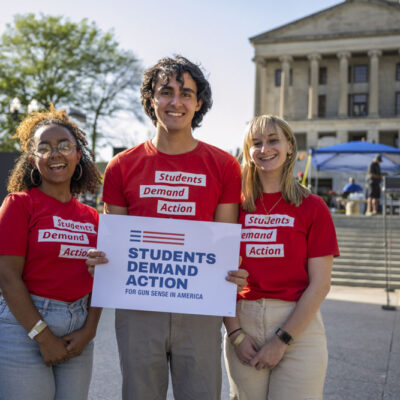COVID & Gun Violence
What is the problem?
Unprecedented increases in gun sales, combined with economic distress and social isolation due to COVID-19, intensified the country’s gun violence crisis.
The United States experienced the collision of two major public health crises: COVID-19 and gun violence. While millions in the U.S. rushed out to purchase guns in the middle of a global pandemic, thinking they were buying safety, research shows that they were in fact exposing themselves to higher risks of gun violence. At the same time, structural inequities fueling community gun violence were exacerbated. Moving forward, we must invest in policies that improve the plight of all Americans and save lives.
Why is it an issue?
The pandemic highlights the weaknesses in existing gun laws.
The pandemic highlighted the deadliness of weak gun purchase and access laws that allow firearms to fall into the wrong hands and also shed light on existing structural inequity. The coronavirus put vulnerable populations, including women, children, and communities of color, at heightened risk. The lethal impact of these crises, though devastating, helps point the way to laws, policies, and programs that can keep people safe and healthy.
By the numbers
30%
Unintentional shooting deaths by children increased by over 30 percent from March to December of 2020, compared to 2019.
150%
Police departments in the 16 largest US cities reported a nearly 150 percent increase in hate crimes targeting Asian Americans in 2020.
22M
An estimated 22 million guns were purchased in 2020, a 64 percent increase over 2019.
4/10
4 in 10 Americans reported that their mental health has been negatively impacted as a result of COVID-19-related stress and anxiety, at the end of March 2020.
What are the solutions?
-
Close the Charleston Loophole
Under federal law, gun purchases may move forward by default after three business days—even if a background check has not been completed.118 U.S.C. 922(t)(1)(B)(ii). While more than 90 percent of federal background checks are completed in minutes,2FBI, “National Instant Criminal Background Check System 2022 Operations Report,” 2023, https://www.fbi.gov/file-repository/nics-2022-operations-report.pdf/view. those that take longer than three business days are four times as likely to be denied.3Everytown Research analysis of Federal Bureau of Investigation, NICS Operations Reports 2015–2019, https://bit.ly/36nWN6X. Of the 76,693 checks that were delayed past three business days and resolved within 90 days annually, 4,059 checks were later found to have resulted in illegal sales—or 5.3 percent. Each year, of the 7,732,373 checks processed by the FBI that were immediately resolved, 102,717 were denied—or 1.3 percent.
-
Secure Gun Storage
Gun owners can make their homes and communities safer by storing their guns securely. This means storing them unloaded, locked, and separate from ammunition.
-
Extreme Risk Laws
When a person is in crisis and considering harming themselves or others, family members and law enforcement are often the first people to see the warning signs. Extreme Risk laws, sometimes referred to as “Red Flag” laws, allow loved ones or law enforcement to intervene by petitioning a court for an order to temporarily prevent someone in crisis from accessing guns.
-
Prohibit People With Dangerous Histories From Having Guns
People with dangerous histories must be prohibited from having guns. Federal law prohibits gun possession by certain categories of people. States also set standards for who is too dangerous to have guns. People prohibited by federal or state law will fail a background check if they try to buy a gun from a licensed dealer.
-
Violence Intervention Programs
Community violence intervention programs provide evidence and community-informed, comprehensive support to individuals who are at the greatest risk of gunshot victimization. These programs are shown to reduce gunshot woundings and deaths in the neighborhoods most impacted by gun violence.
-
Disarm Hate
Guns and hate are a fatal combination. In an average year, more than 25,000 hate crimes in the United States involve a firearm—more than 69 each day.1Everytown Research analysis of the National Crime Victimization Survey (NCVS). A yearly average was developed using 12 years of the most recently available data: 2010 to 2021. In parts of the US, some people convicted of hate crimes can still legally buy and have guns. Congress and state legislatures must pass laws that keep guns out of the hands of those who have been convicted of hate crimes.




